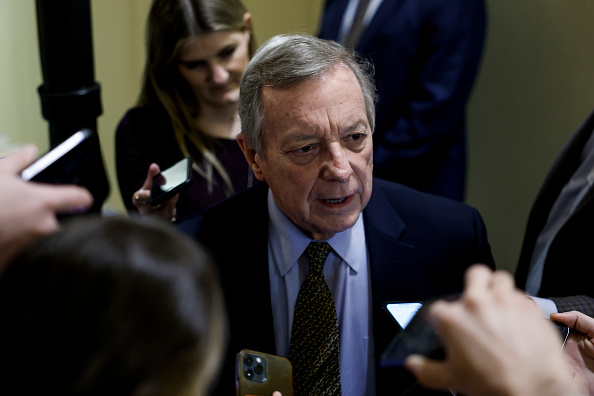Senate Judiciary Chair Dick Durbin (D-IL) has invited Supreme Court Chief Justice John Roberts—or any other justice he designates—to testify at an upcoming committee hearing on ethics reform, in the wake of recent revelations about a billionaire GOP mega-donor’s friendship with one of his colleagues.
The Illinois Democrat sent Roberts a letter on Thursday requesting his appearance at a hearing set for May 2. “The time has come for a new public conversation on ways to restore confidence in the Court’s ethical standards,” he wrote.
In the letter, Durbin points out that there’s precedent for a sitting justice to speak before a Senate panel: Former Justices Antonin Scalia and Stephen Breyer testified before the Judiciary Committee about the high court’s ethical standards in the fall of 2011.
Back then, as now, Justice Clarence Thomas had become embroiled in a scandal based on his friendship with billionaire Harlan Crow, a Texan real estate magnate who’s donated millions of dollars to conservative causes. Thomas was chastised for appearing at events by Republican-backed groups and accepting favors from Crow back then; today, he’s fallen under similar scrutiny after ProPublica revealed that he’d accepted luxury trips and lucrative real estate deals from the mega-donor.
“These problems were already apparent back in 2011, and the Court’s decade-long failure to address them has contributed to a crisis of public confidence,” Durbin wrote. “The status quo is no longer tenable.”
Rep. Cori Bush (D-MO), a member of the judiciary panel in the House, joined progressive lawmakers on Tuesday in demanding that Thomas be impeached. That same day, Durbin called for a hearing on ethics reform. “Judges and justices are entrusted by the American people to serve the public interest and administer equal justice under the law,” he said in a statement that day. “That’s why taxpayers, not billionaire donors, fund judicial salaries, courthouses, and operations.”
He noted that there’s also precedent for Congress to intervene in the federal judiciary’s affairs, such as the Courthouse Ethics and Transparency Act from last summer which expanded public access to reports filed by judges.
“But the Supreme Court doesn’t need to wait on Congress to clean up its act,” he said. “The justices could take action today if they wanted to. And if the Court fails to act, Congress must.”
Read the full letter below:



